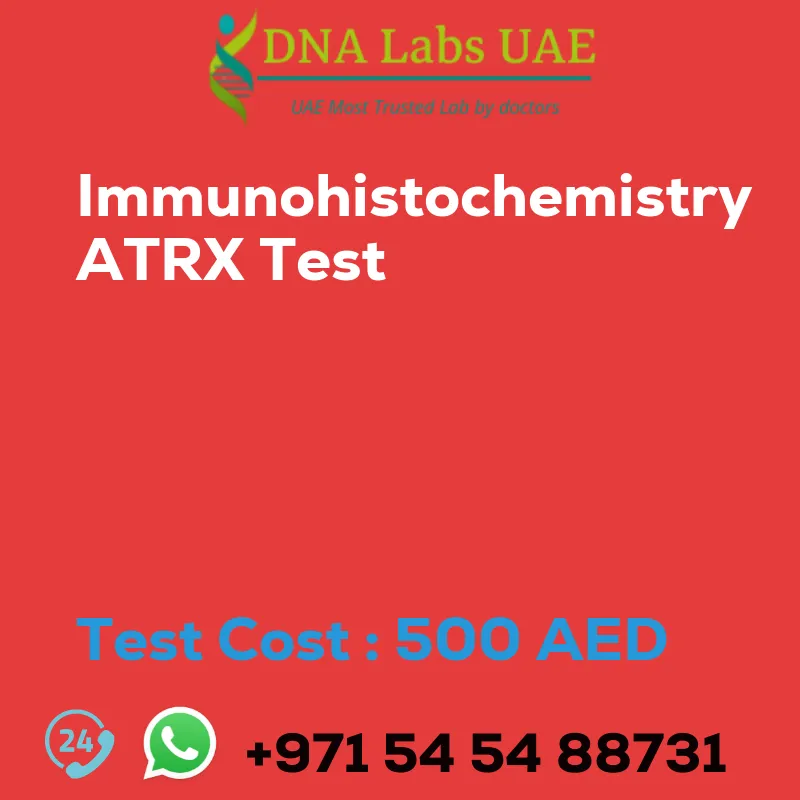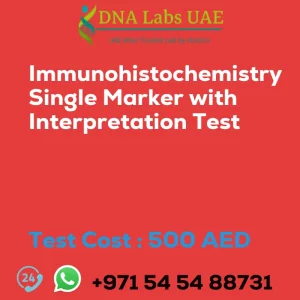IMMUNOHISTOCHEMISTRY ATRX Test
Test Name: IMMUNOHISTOCHEMISTRY ATRX Test
Components: ATRX protein expression detection
Price: 500.0 AED
Sample Condition: Submit tumor tissue in 10% Formal-saline OR Formalin fixed paraffin embedded block. Ship at room temperature. Provide a copy of the Histopathology report, Site of biopsy and Clinical history.
Report Delivery: Sample: Daily by 6 pm; Report: Block – 5 days, Tissue Biopsy – 5 days, Tissue large complex – 7 days
Method: Immunohistochemistry
Test Type: Cancer
Doctor: Oncologist
Test Department: HISTOLOGY
Pre Test Information: Provide a copy of the Histopathology report, Site of biopsy and Clinical history.
Test Details
The ATRX test is an immunohistochemistry (IHC) test used to detect the expression of the ATRX protein in tissue samples. ATRX is a chromatin remodeling protein that plays a role in maintaining the structure and stability of DNA.
Mutations or loss of ATRX expression have been associated with certain types of cancer, such as gliomas and pancreatic neuroendocrine tumors. The ATRX IHC test involves staining tissue sections with an antibody specific to the ATRX protein. The antibody binds to the ATRX protein if it is present in the tissue sample. This binding is then visualized using a detection system, such as a chromogenic or fluorescent marker. The presence or absence of ATRX protein expression can be observed under a microscope.
The ATRX test is commonly used in diagnostic pathology to help determine the molecular profile of tumors and guide treatment decisions. It can provide information on the presence or absence of ATRX protein expression, which may have prognostic or therapeutic implications. For example, loss of ATRX expression in gliomas has been associated with a better response to certain chemotherapy drugs.
It is important to note that the ATRX test is just one component of a comprehensive diagnostic workup for cancer patients. It is typically performed alongside other tests, such as genetic sequencing or other immunohistochemistry markers, to provide a more complete understanding of the tumor’s molecular characteristics.
| Test Name | IMMUNOHISTOCHEMISTRY ATRX Test |
|---|---|
| Components | |
| Price | 500.0 AED |
| Sample Condition | Submit tumor tissue in 10% Formal-saline OR Formalin fixed paraffin embedded block. Ship at room temperature. Provide a copy of the Histopathology report, Site of biopsy and Clinical history. |
| Report Delivery | Sample Daily by 6 pm; Report Block : 5 days Tissue Biopsy : 5 days Tissue large complex : 7 days |
| Method | Immunohistochemistry |
| Test type | Cancer |
| Doctor | Oncologist |
| Test Department: | HISTOLOGY |
| Pre Test Information | Provide a copy of the Histopathology report, Site of biopsy and Clinical history. |
| Test Details |
The ATRX test is an immunohistochemistry (IHC) test used to detect the expression of the ATRX protein in tissue samples. ATRX is a chromatin remodeling protein that plays a role in maintaining the structure and stability of DNA. Mutations or loss of ATRX expression have been associated with certain types of cancer, such as gliomas and pancreatic neuroendocrine tumors. The ATRX IHC test involves staining tissue sections with an antibody specific to the ATRX protein. The antibody binds to the ATRX protein if it is present in the tissue sample. This binding is then visualized using a detection system, such as a chromogenic or fluorescent marker. The presence or absence of ATRX protein expression can be observed under a microscope. The ATRX test is commonly used in diagnostic pathology to help determine the molecular profile of tumors and guide treatment decisions. It can provide information on the presence or absence of ATRX protein expression, which may have prognostic or therapeutic implications. For example, loss of ATRX expression in gliomas has been associated with a better response to certain chemotherapy drugs. It is important to note that the ATRX test is just one component of a comprehensive diagnostic workup for cancer patients. It is typically performed alongside other tests, such as genetic sequencing or other immunohistochemistry markers, to provide a more complete understanding of the tumor’s molecular characteristics. |








